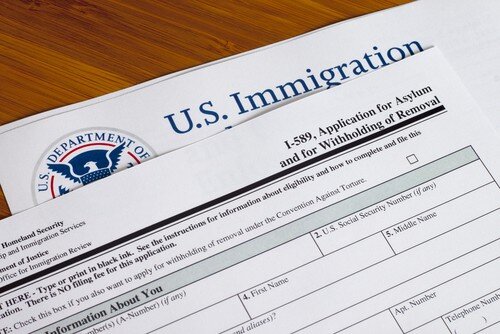“No-Blanks” Policy Undermines Protections for Survivors of Crime
- November 2020 -
It's been called Kafkaesque. Absurd. Nonsense. Frightening and ridiculous and awful. We agree. It’s yet another example of a policy by the Administration that weaponizes bureaucracy not in order to solve problems or help people, but to diminish the promise of protection.
Among the slew of immigration-related policy changes that the administration uses to limit protections for immigrant survivors of crime is the “no-blanks” policy. Under the “no-blanks” policy, U.S. Citizenship and Immigration Services (USCIS) has been rejecting applications for asylum and U and T visas simply for having a blank space on a form. This policy has life-altering consequences, by delaying a person's ability to work or, even worse, jeopardizing their ability to seek safety by remaining in the U.S.
As Washington Post columnist Catherine Rampell explains, “‘middle name’ field left blank because the applicant does not have a middle name? Sorry, your application gets rejected. No apartment number because you live in a house? You’re rejected, too.”
“no-blanks” policy intentionally undermines VAWA & TVPA
Disturbing records reveal that “by January 17, 2020, USCIS had utilized the
no-blanks policy to reject approximately 98% of filed U-visa petitions. By July 2020,
the no-blanks policy had resulted in USCIS’s rejection of nearly 12,000
U-visa petitions filed by cooperating crime victims.”
Vicente Omar Barraza, an Attorney in Washington State, shared the redacted application above with AIS to help illustrate the absurdity of the "no-blanks" policy. In this case, his client from Mexico was rejected outright for no logical reasons.
First, the I-589 asylum application was rejected for failing to provide another job in the list of employment over the last five years even though the list was complete and for not including the name of an additional sibling who does not exist. "We corrected those errors and resent the package only to have it rejected a second time because we did not provide aliases (which do not exist) and which were not a basis cited in the first rejection," said Barraza in an email. "These delays risk USCIS concluding the client did not timely file his application." (Credit: Vincente Omar Barraza)
Congress passed the Violence Against Women Act (VAWA) and Trafficking Victims Protection Act (TVPA), which led to the creation of U and T visas, with the explicit aim to provide immigrant survivors of domestic violence, sexual assault, human trafficking, and other forms of gender-based abuse with a pathway to safety. The “no-blanks” policy undermines Congressional intent to support immigrant survivors and is yet another way to unjustly and arbitrarily prevent immigrant survivors from accessing humanitarian protections.
It could not be any clearer that the “no-blanks” policy specifically seeks to deny immigrant survivors of crime access to the protection they need and deserve.
Learn More & Help Spread the Word
The following resources offer more information about the alarming impact the “no-blanks” policy has on survivors of violence, how AIS and our allies have been pushing back, and what you can do to help.
AIS-Co-Chair ASISTA letter to USCIS and the CIS Ombudsman requesting the agency terminate the “no-blanks” policy (February 2020)
Sign on letter to USCIS from 146 national, state and local agencies urging USCIS to rescind the no-blanks policy (August 2020)
Sen. Gillibrand led a letter to USCIS alongside 11 senators requesting immediate review of the “no-blanks” policy (September 2020)
Cleary Gottlieb
Cleary Obtains FOIA Records Revealing USCIS Rushed to Impose New Barriers Resulting in the Improper Rejection of Thousands of U-Visa Petitions | October 22, 2020American Immigration Lawyers Association (AILA)
Featured Issue: USCIS’s Blank Space Policy | October 22, 2020American Immigration Lawyers Association (AILA)
AILA Policy Brief: USCIS’s “No Blank Space” Policy Leads to Capricious Rejections of Benefits Requests | October 22, 2020American Immigration Lawyers Association (AILA)
Social Media Toolkit: Congress Must Hold USCIS Accountable and End Its Capricious No Blank Space Policy
Media Coverage
Sam Peak, The Bulwark
Trump Is Building His Wall Out of Red Tape And legal immigrants are paying for it. | September 14, 2020Catherine Rampell, Washington Post
The Trump administration’s no-blanks policy is the latest Kafkaesque plan designed to curb immigration | August 6, 2020Catherine Rampell, Washington Post
Twitter Thread on Blank Spaces PolicyVeena Iyer, MinnPost
Immigration through the looking glass: our country’s fill-in-every-blank nonsense | February 14, 2020Catherine Rampell, Washington Post
This latest trick from the Trump administration is one of the most despicable yet | February 13, 2020Charles Davis, The Guardian,
Bureaucracy as a weapon: how the Trump administration is slowing asylum cases | December 23, 2019
Help spread the word about the dangers of the “no-blanks” policy, by sharing this AIS Tweet thread and using AILA’s Social Media Toolkit: Congress Must Hold USCIS Accountable and End Its Capricious No Blank Space Policy.


